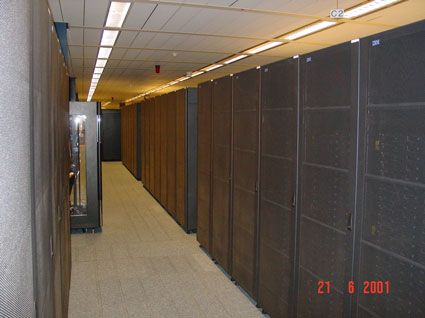Het kleine bedrijfje Quadrics uit Engeland dat supercomputers maakt, gaat nu ook de Itanium 2 ondersteunen, zo meldt C|Net. De software en de netwerkkaarten die dit bedrijfje leverden voor systemen gebaseerd op Xeon processors kunnen nu ook voor Itanium 2 systemen gebruikt worden. Eigenlijk is dit niet zo'n grote stap omdat de software nauwelijks aangepast hoefde te worden en de netwerkkaarten werken in alle standaard PCI-sloten en die zijn ook in Itanium 2 systemen aanwezig. In de eerste helft van volgend jaar zullen waarschijnlijk ook netwerkkaarten die PCI-X gebruiken beschikbaar komen. Quadrics bouwt cluster supercomputers, welke populair zijn wanneer veel kracht voor weinig geld nodig is.
Clusters worden gemaakt door redelijk standaard computers via een netwerk met elkaar te koppelen. Zo kunnen ze veel goedkoper zijn dan normale supercomputers maar is het programmeren wel een stuk lastiger en voor sommige taken zijn ze niet echt geschikt door het relatief langzame interconnectie netwerk. Bijna altijd wordt er Linux gebruikt als besturingssysteem maar er bestaan ook Windows clusters. Dit soort systemen worden vooral gebruikt om genetische informatie uit te pluizen, geologische data te analyseren en voor onderzoek aan veel universiteiten. Dit is voor Intel uiteraard weer een kleine stap in de goede richting, want de Itanium 2 is ontworpen voor dit soort toepassingen:
The Itanium family is a good match for supercomputers. The chips are well-suited to churn through mathematical calculations. And though there's not as much software for the processors, supercomputer customers often write their own programs and don't need the many software packages mainstream businesses rely on.
Linux is far and away the most widely used operating system for the new breed of clustered supercomputers, though there are some instances of Windows clusters, such as one at the one at the Cornell Theory Center. In Quadrics' case, the company's software requires deep access to the operating system's heart, or kernel, something that's easy with the open-source General Public License (GPL) that governs Linux. "Currently we are not seeing a concerted effort to port to Windows," a company representative said.

Met dank aan Verwijderd voor de tip.
